12 Aug 2022 | Magazine, News and features, Student Reading Lists

Salman Rushdie. Credit: Fronteiras do Pensamento
On 12 August 2022, Salman Rushdie, the author of the book The Satanic Verses, was attacked as he prepared to give a lecture at the Chautauqua Institution, an arts and education centre in New York state.
Index on Censorship has supported Rushdie’s right to express himself ever since he came into the public eye more than three decades ago.
On 14 February 1989 Iran’s Ayatollah Khomeini issued a fatwa ordering Muslims to execute Rushdie over the publication of The Satanic Verses, along with anyone else involved with the novel.
Published in the UK in 1988 by Viking Penguin, the book was met with widespread protest by those who accused Rushdie of blasphemy and unbelief. Death threats and a $6 million bounty on the author’s head saw him take on a 24-hour armed guard under the British government’s protection programme.
The book was soon banned in a number of countries, from Bangladesh to Venezuela, and many died in protests against its publication, including on 24 February when 12 people lost their lives in a riot in Bombay, India. Explosions went off across the UK, including at Liberty’s department store, which had a Penguin bookshop inside, and the Penguin store in York.
Book store chains including Barnes and Noble stopped selling the book, and copies were burned across the UK, first in Bolton where 7,000 Muslims gathered on 2 December 1988, then in Bradford in January 1989. In May 1989 between 15,000 to 20,000 people gathered in Parliament Square in London to burn Rushdie in effigy.
In October 1993, William Nygaard, the novel’s Norwegian publisher, was shot three times outside his home in Oslo and seriously injured.
Rushdie came out of hiding after nine years, but as recently as February 2016, money has been raised to add to the fatwa, reminding the author As that for many the Ayatollah’s ruling still stands.
As his supporters around the world, including Index, pray for a positive outcome, we highlight key articles from our archives from before, during and after the issue of the fatwa, including two from Rushdie himself.
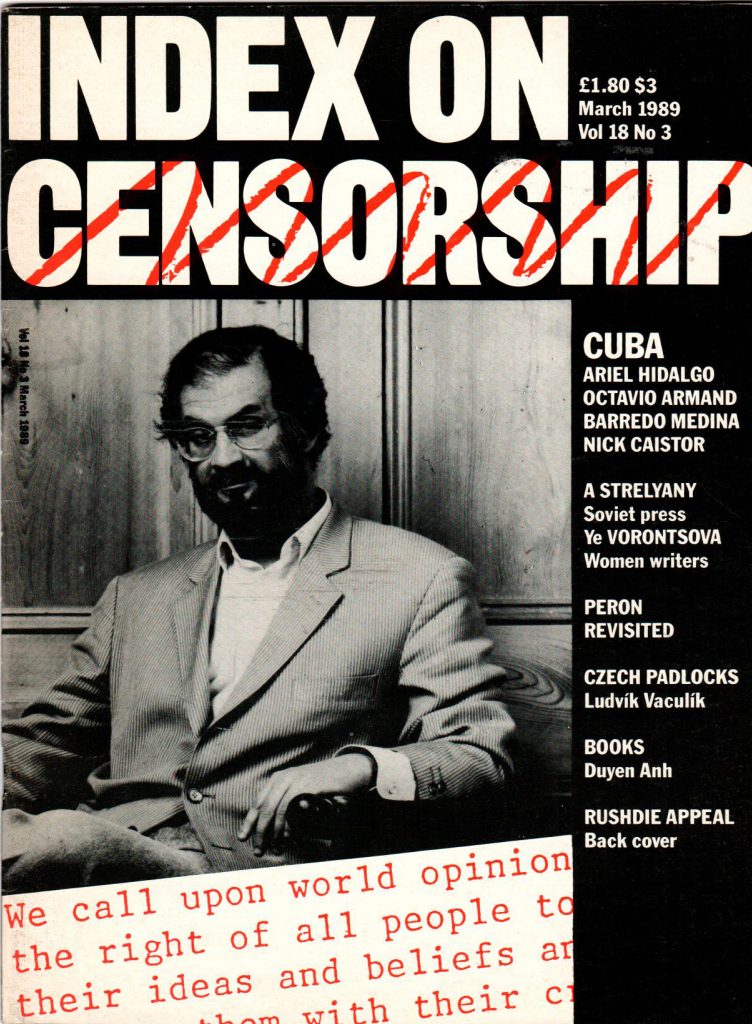
Cuba today, the March 1989 issue of Index on Censorship magazine.
World statement by the international committee for the defence of Salman Rushdie and his publishers
March 1989, vol. 18, issue 3
On 14 February the Ayatollah Khomeini called on all Muslims to seek out and execute Salman Rushdie, the author of The Satanic Verses, and all those involved in its publication. We, the undersigned, insofar as we defend the right to freedom of opinion and expression as embodied in the Universal Declaration of Human Rights, declare that we also are involved in the publication. We are involved whether we approve the contents of the book or not. Nonetheless, we appreciate the distress the book has aroused and deeply regret the loss of life associated with the ensuing conflict.
Read the full article

Islam & human rights, the May 1989 issue of Index on Censorship magazine.
Pandora’s box forced open
Amir Taheri
May 1989, vol. 18, issue 5
‘What Rushdie has done, as far as Muslim intellectuals are concerned, is to put their backs to the wall and force them to make the choice they have tried to avoid for so long’. Last year, when poor old Mr Manavi filled in his Penguin order form for 10 copies of Salman Rushdie’s third novel, The Satanic Verses, he could not have imagined that the book, described by its publishers as a reflection on the agonies of exile, would provoke one of the most bizarre diplomatic incidents in recent times. Mr Manavi had been selling Penguin books in Tehran for years. He had learned which authors to regard as safe and which ones to avoid at all costs.
Read the full article

Islam & human rights, the May 1989 issue of Index on Censorship magazine.
Jihad for freedom
Wole Soyinka
May 1989, vol. 18, issue 5
This statement is not, of course, addressed to the Ayatollah Khomeini who, except for a handful of fanatics, is easily diagnosed as a sick and dangerous man who has long forgotten the fundamental tenets of Islam. It is useful to address oneself, at this point, only to the real Islamic faithful who, in their hearts, recognise the awful truth about their erratic Imam and the threat he poses not only to the continuing acceptance of Islam among people of all religions and faiths but to the universal brotherhood of man, no matter the differing colorations of their piety. Will Salman Rushdie die? He shall not. But if he does, let the fanatic defenders of Khomeini’s brand of Islam understand this: The work for which he is now threatened will become a household icon within even the remnant lifetime of the Ayatollah. Writers, cineastes, dramatists will disseminate its contents in every known medium and in some new ones as yet unthought of.
Read the full article
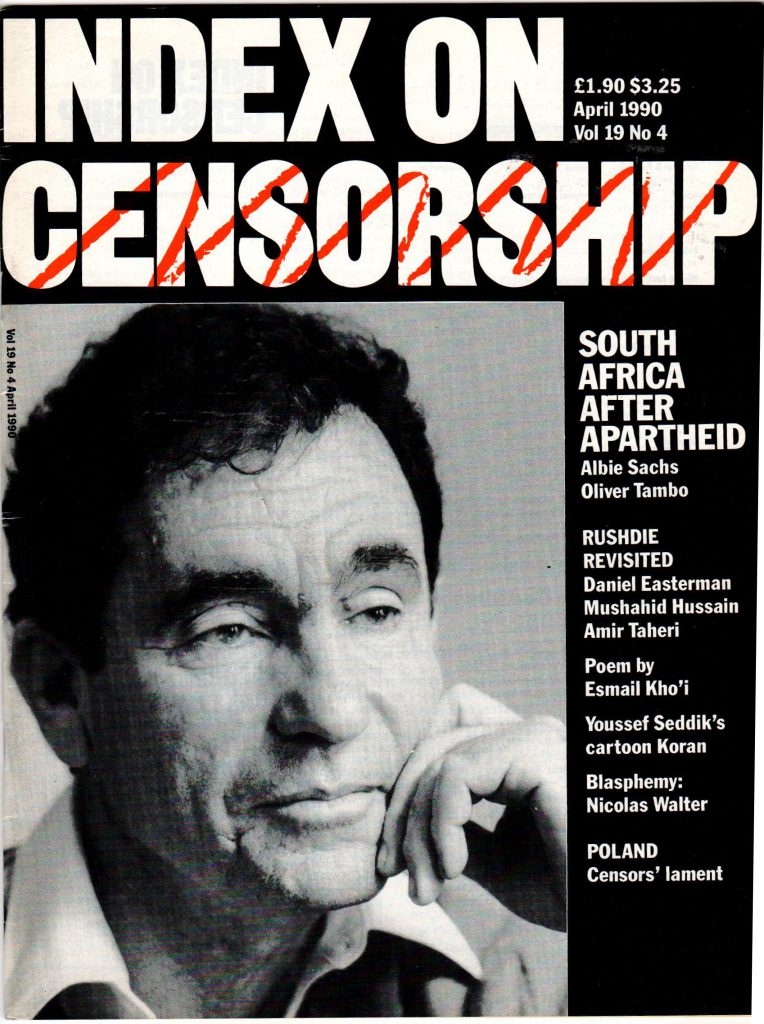
South Africa after Apartheid, the April 1990 issue of Index on Censorship magazine.
Reflections on an invalid fatwah
Amir Taheri
April 1990, vol. 19, issue 4
Broadly speaking, three predictions were made. The first was that Khomeini’s attempt at exporting terror might goad world public opinion into a keener understanding of Iran’s tragedy since the Islamic Revolution of 1979. The fact that the Ayatollah had executed thousands of people, including many writers and poets since his seizure of power in Tehran had provoked only mild rebuke from Western governments and public opinion. With the fatwa against Rushdie, we thought the whole world would mobilise against the ayatollah, turning his regime into an international pariah. Nothing of the kind happened, of course, and only one country, Britain, closed its embassy in Tehran – and that because the mullahs decided to sever.diplomatic ties. In the past twelve months Federal Germany and France have increased their trade with the Islamic Republic to the tune of II and 19 per cent respectively. The EEC countries and Japan have, in the meantime, provided the Islamic Republic with loans exceeding £2,000 million. The stream of European and Japanese businessmen and diplomats visiting Tehran turned into a mini-flood after Khomeini’s death last June.
Read the full article

South Africa after Apartheid, the April 1990 issue of Index on Censorship magazine.
Salman Rushdie and political expediency
Adel Darwish
April 1990, vol. 19, issue 4
When I reviewed Salman Rushdie’s Satanic Verses in September 1988, it never crossed my mind to make any reference to possible offence to Muslim readers, let alone to anticipate the unprecedented international crisis generated in the months that followed. I do not think I was naive – as an LBC radio reporter suggested when she interviewed me at the first public reading from The Satanic Verses in June 1989. On the contrary, I can claim more than many that I am able to understand what Mr Rushdie was trying to say in his book, and the way the crisis has developed. Like Mr Rushdie, I am a British writer, born to a Muslim family. Born in Egypt, I was educated and am employed in Britain, and have been preoccupied and engaged, mainly in the 1960s and 1970s, with the issues that Mr Rushdie has fought for and with which he seemed to be very much concerned in his book.
Read the full article
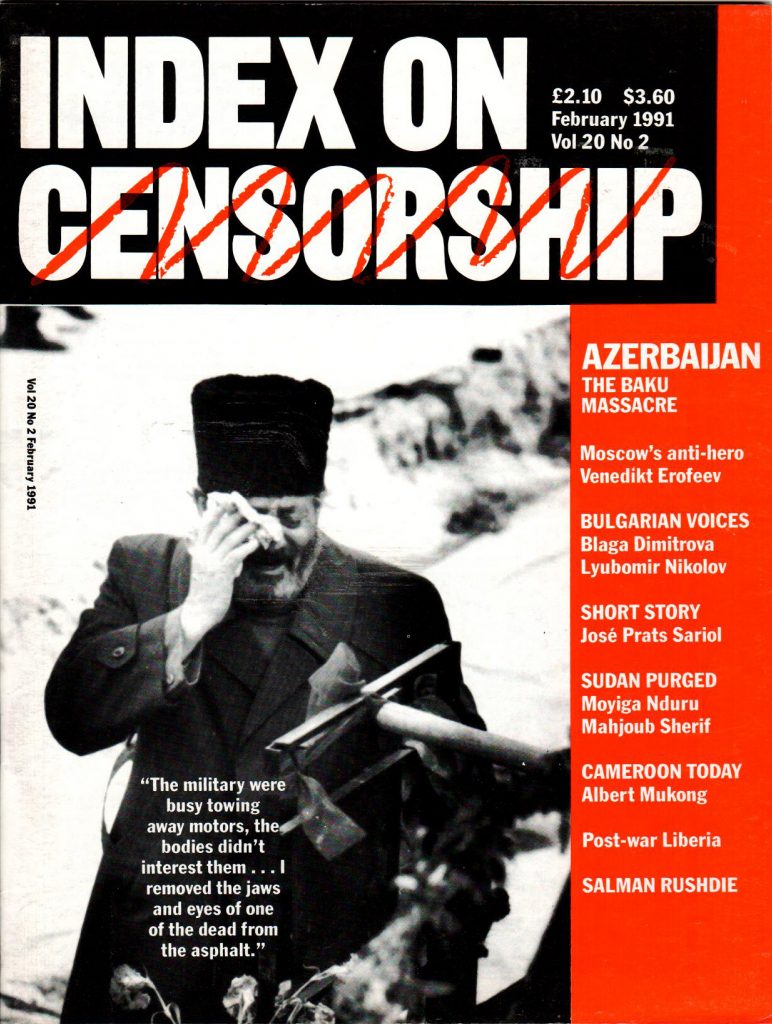
Azerbaijan, the February 1991 issue of Index on Censorship magazine.
My decision
Salman Rushdie
February 1991, vol. 20, issue 2
A man’s spiritual choices are a matter of conscience, arrived at after deep. reflection and in the privacy of his heart. They are not easy matters to speak of publicly. I should like, however, to say something about my decision to affirm the two central tenets of Islam — the oneness of God and the genuineness of the prophecy of the Prophet Muhammad —and thus to enter into the body of Islam after a lifetime spent outside it. Although I come from a Muslim family background, I was never brought up as a believer, and was raised in an atmosphere of what is broadly known as secular humanism. I still have the deepest respect for these principles. However, as I think anyone who studies my work will accept, I have been engaging more and more with religious belief, its importance and power, ever since my first novel used the Sufi poem Conference of the Birds by Farid ud-din Attar as a model. The Satanic Verses itself, with its portrait of the conflicts between the material and spiritual worlds, is a mirror of the conflict within myself.
Read the full article
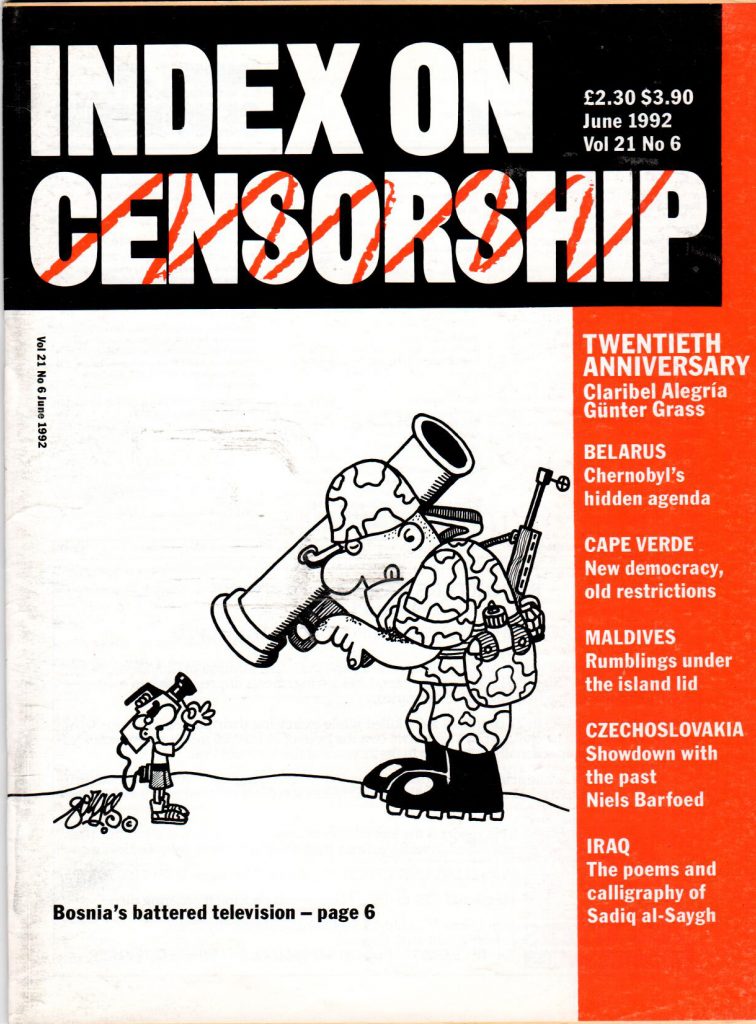
20th Anniversary: Reign of terror, the June 1992 issue of the Index on Censorship magazine.
Offending the high priests
Gunter Grass
June 1992, vol. 21, issue 6
When George Orwell returned from Spain in 1937, he brought with him the manuscript of Homage to Catalonia. It reflected the experiences he had gathered during the Civil War. At first, he was unable to find a publisher because a multitude of influential, left-wing intellectuals had no wish to acknowledge its shocking observations. They did not want to accept the Stalinist terror, the systematic liquidation of anarchists, Trotskyists and left-wing socialists. Orwell himself only narrowly escaped this terror. His stark accusations contradicted a world image of a flawless Soviet Union fighting against Fascism. Orwell’s report, this onslaught of terrible reality, tarnished the picture-book dream of Good and Evil. A year later, a bourgeois Western publisher brought out Homage to Catalonia; in the areas of Communist rule, Orwell’s works – among them the bitter Spanish truth – were banned for half a century. The minister responsible for state security= in the German Democratic Republic, right to its end, was Erich Mielke. During the Spanish Civil War, he was a member of the Communist cadre to whom purge through liquidation became commonplace. A fighter for Spain with an extraordinary capacity for survival.
Read the full article[/vc_column_text][/vc_column][/vc_row][vc_row][vc_column][vc_column_text]

Russia’s choice, the November-December 1993 issue of Index on Censorship magazine.
The Rushdie affair: Outrage in Oslo
Hakon Harket
November 1993, vol. 22, issue 10
The terrorist state of Iran must face the consequences of refusing to lift the fatwa that condemns Salman Rushdie, and those associated with his work, to death. When someone, in accordance with the express order of the fatwa, attempts to murder one of the damned, the obvious consequence is that Iran must be held responsible for the crime it has called for, at least until there is conclusive proof that no connection exists. The shooting of William Nygaard has reminded the Norwegian public of what the Rushdie affair is really about: life and death; the abuse of religion; the fiction of a free mind. This war of terror against freedom of speech is not one we can afford to lose. Since the nightmare clearly will not disappear of its own accord, it must be engaged head-on.
Read the full article

New censors, the March 1996 issue of Index on Censorship magazine.
From Salman Rushdie
March 1996, vol. 25, issue 2
This statement is not, of course, addressed to the Ayatollah Khomeini who, except for a handful of fanatics, is easily diagnosed as a sick and dangerous man who has long forgotten the fundamental tenets of Islam. It is useful to address oneself, at this point, only to the real Islamic faithful who, in their hearts, recognise the awful truth about their erratic Imam and the threat he poses not only to the continuing acceptance of Islam among people of all religions and faiths but to the universal brotherhood of man, no matter the differing colorations of their piety. Will Salman Rushdie die? He shall not. But if he does, let the fanatic defenders of Khomeini’s brand of Islam understand this: The work for which he is now threatened will become a household icon within even the remnant lifetime of the Ayatollah. Writers, cineastes, dramatists will disseminate its contents in every known medium and in some new ones as yet unthought of.
Read the full article
The Rushdie affair: Outrage in Oslo
Hakon Harket
November 1993, vol. 22, issue 10
The terrorist state of Iran must face the consequences of refusing to lift the fatwa that condemns Salman Rushdie, and those associated with his work, to death. When someone, in accordance with the express order of the fatwa, attempts to murder one of the damned, the obvious consequence is that Iran must be held responsible for the crime it has called for, at least until there is conclusive proof that no connection exists. The shooting of William Nygaard has reminded the Norwegian public of what the Rushdie affair is really about: life and death; the abuse of religion; the fiction of a free mind. This war of terror against freedom of speech is not one we can afford to lose. Since the nightmare clearly will not disappear of its own accord, it must be engaged head-on.
Read the full article

New censors, the March 1996 issue of Index on Censorship magazine.
From Salman Rushdie
March 1996, vol. 25, issue 2
This statement is not, of course, addressed to the Ayatollah Khomeini who, except for a handful of fanatics, is easily diagnosed as a sick and dangerous man who has long forgotten the fundamental tenets of Islam. It is useful to address oneself, at this point, only to the real Islamic faithful who, in their hearts, recognise the awful truth about their erratic Imam and the threat he poses not only to the continuing acceptance of Islam among people of all religions and faiths but to the universal brotherhood of man, no matter the differing colorations of their piety. Will Salman Rushdie die? He shall not. But if he does, let the fanatic defenders of Khomeini’s brand of Islam understand this: The work for which he is now threatened will become a household icon within even the remnant lifetime of the Ayatollah. Writers, cineastes, dramatists will disseminate its contents in every known medium and in some new ones as yet unthought of.
Read the full article

Tolerance and the intolerable, the May 1994 issue of Index on Censorship magazine
Bosnia on my mind
Salman Rushdie
May 1994, vol. 23, issue 1-2
When the Balkans War broke out, Rushdie had never been to Sarajevo, but felt that he belonged to it. He imagined a Sarajevo of the mind, whose ruination and torment exiled everyone.
He wrote: “Sarajevo’s truth is that its citizens, who reject definition by religion or confession, who wish to be simply Bosnians, have for their pains been labelled by the outside world as ‘Muslims’. It is instructive to imagine how things might have gone in former Yugoslavia if the Bosnians had been Christians and the Serbs had been Muslims, even Muslims ‘in name only’. Would Europe have supported a ‘Serbian Muslim’ carve-up of the defunct state? It’s only a guess, but I guess that it would not. Which being true, it must also be true that the ‘Muslim’ tag is part of the reason for Europe’s indifference to Sarajevo’s fate.”
Read the full article
 The right to publish
The right to publish
Peter Mayer
December 2008, vol. 37, issue 4
As publisher of The Satanic Verses, Peter Mayer was on the front line. He writes here for the first time about an unprecedented crisis:
Penguin published Salman Rushdie’s The Satanic Verses six months before Ayatollah Khomeini issues his fatwa. When we decided to continue publishing the novel in the aftermath, extraordinary pressures were focused on our company, based on fears for the author’s life and for the lives of everyone at Penguin around the world. This extended from Penguin’s management to editorial, warehouse, transport, administrative staff, the personnel in our bookshops and many others. The long-term political implications of that early signal regarding free speech in culturally diverse societies were not yet apparent to many when the Ayatollah, speaking not only for Iran but, seemingly, for all of Islam, issued his religious proclaimation.
Read the full article
 Emblem of darkness
Emblem of darkness
Bernard-Henri Lévy
December 2008, vol. 37, issue 4
As publisher of The Satanic Verses, Peter Mayer was on the front line. He writes here for the first time about an unprecedented crisis:
Salman Rushdie was not yet the great man of letters that he has since become. He and I are, though, pretty much the same age. We share a passion for India and Pakistan, as well as the uncommon privilege of having known and written about Zulfikar Ali Bhutto (Rushdie in Shame; I in Les Indes Rouges), the father of Benazir, former prime minister of Pakistan, executed ten years earlier in 1979 by General Zia. I had been watching from a distance, with infinite curiosity, the trajectory of this almost exact contemporary. One day, in February 1989, at the end of the afternoon, as I sat in a cafe in the South of France, in Saint Paul de Vence, with the French actor Yves Montand, sipping an orangeade, I heard the news: Ayatollah Khomeini, himself with only a few months to live, had just issued a fatwa, in which he condemned as an apostate the author of The Satanic Verses and invited all Muslims the world over to carry out the sentence, without delay.
Read the full article
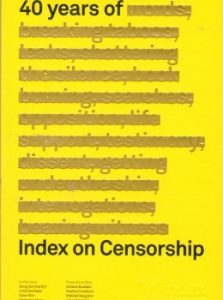
40 years of Index on Censorship March 2012
Last chance?
Salman Rushdie
March 2012, vol. 41, issue 1
Salman Rushdie’s first memories of censorship are cinematic: screen kisses brutalised by prudish scissors which chopped out the moments of actual contact. (Briefly, before comprehension dawned, he wondered if that were all there was to kissing, the languorous approach and then the sudden turkey-jerk away.) The effect was usually somewhat comic, and censorship still retains, in contemporary Pakistan, a strong element of comedy. When the Pakistani censors found that the movie El Cid ended with a dead Charlton Heston leading the Christians to victory over live Moslems, they nearly banned it until they had the idea of simply cutting out the entire climax, so that the film as screened showed El Cid mortally wounded. El Cid dying nobly, and then it ended. Muslims 1, Christians 0.
Read the full article
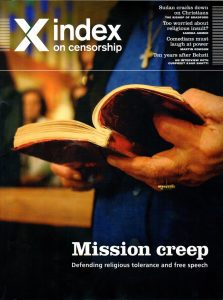
The winter 2013 issue of Index on Censorship magazine.
Defending the right to be offended
Samira Ahmed
December 2013, vol. 42, issue 4
The tensions between freedom of speech and religious belief remain acute – and they are systematically exploited by political groups of all stripes, from the English Defence League to radical Islamists who threaten to disrupt the repatriation of dead British soldiers at Wootton Bassett. The story consistently makes the headlines. The idea that there is an Islamist assault on British freedoms and values is widespread.
The Muslim campaign against Salman Rushdie’s The Satanic Verses in 1988 was the crucial moment in all this. It forced writers and artists from an Asian or Muslim background, whether they defined themselves that way or not, to take sides. They had to declare loyalty – or otherwise – to the offended.
Read the full article
15 Oct 2020 | China, India, News and features, Pakistan
[vc_row][vc_column][vc_column_text]The Indian government’s revocation of autonomy for Jammu and Kashmir has been a disaster for free speech.
In October 2019, Narendra Modi’s government rescinded article 370 of the Indian constitution which had given the region special autonomous status since 1954. The region is now run as two separate union territories – Ladakh, and Jammu and Kashmir.
Ever since its autonomy was curtailed, access to information for inhabitants has been greatly reduced.
Despite palpable risks to their safety, journalists in the disputed region have remained, but a lack of access to internet has hindered their progress.
Set in the Himalayas, the region is famously beautiful – often described as “heaven on Earth” – but this is in stark contrast to the fierce and often bloody dispute wracking Jammu and Kashmir.
As the situation worsens, we look back at pieces published in Index magazine and online exploring the impact the conflict has had on free speech, journalists and the people who call Kashmir their home.
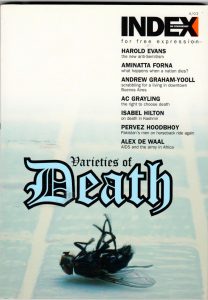
Varieties of death, the winter 2002 issue of Index on Censorship magazine.
Journalist and broadcaster Isabel Hilton visited Kashmir in the early 2000s. She documented her experiences in 2002 and spoke of her encounters with Pakistani military.
The piece is an insight into how much of major conflicts can seem underreported, but in fact are not. For journalists working in the region, the daily reports of death tolls and atrocities are both a livelihood and a duty, but only major events tend to make headline news across the world.
She wrote: “In Srinagar, the journalists — themselves constantly threatened and often attacked by both sides — have grown weary of looking for new angles on death. Only the larger outrages — such as the car bomb attack on Srinagar’s assembly building on 1 October last year which claimed more than 30 lives — are reported internationally.”
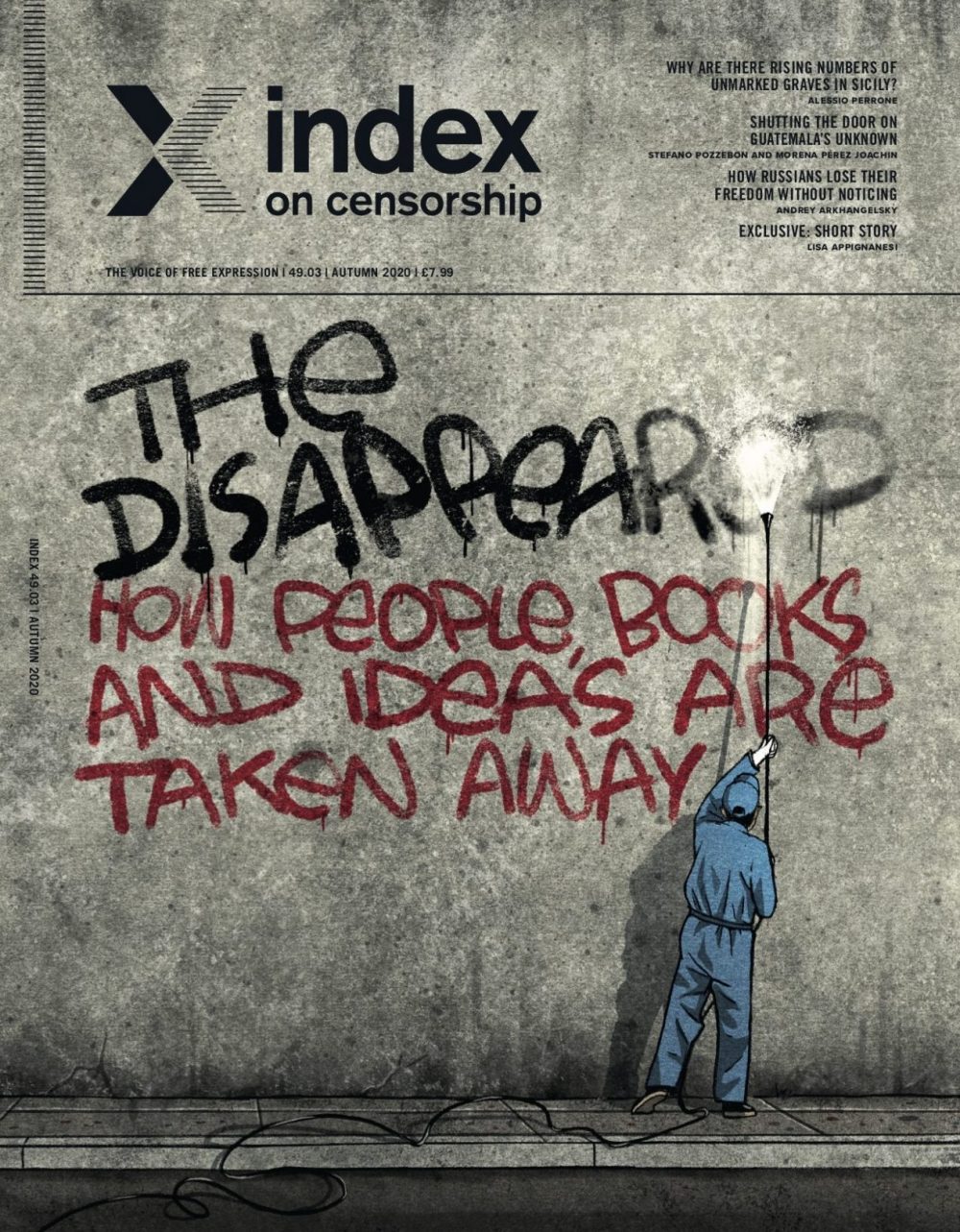
Index on Censorship autumn 2020 issue on the theme of the disappeared
In the most recent edition of Index (which can be read here), Bilal Ahmad Pandow discussed the experiences of journalists in Kashmir.
Since India took control and imposed direct rule, a feeling of (relative) security in the region has been lost and censorship laws have taken a firm grip, he writes.
A new policy for journalists introduced this year by the Jammu and Kashmir government imposes rules on restricting “fake news, plagiarism and unethical or anti-national content”.
“Pressure on media freedom was ratcheted up even further with the introduction of the New Media Policy 2020. Journalists were, of course, already operating under tremendous pressure – harassment, intimidation, the choking of advertisement revenue, imprisonment, draconian laws and a communication blockade – all of which are forcing journalists to self-censor.”
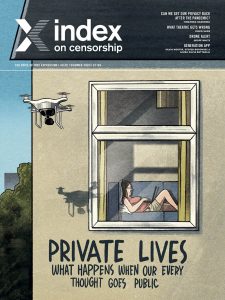
Index on Censorship summer 2020 issue on the theme of privacy
Earlier this year, Kashmiri journalist Bilal Hussain spoke with Index’s Orna Herr on life in the media in the region.
He told Herr of his personal struggles to get copy and videos past online restrictions and out of the country. Journalists have been creative in their attempts to get past the internet blocks designed to limit media freedom, he said.
“Since March 2020, the government allowed restricted internet access that blocked many news websites. So journalists installed VPNs that could break the firewall and enabled journalists to access those websites.”
“Some journalists used to travel to Delhi to access the internet and came back after filing their reports.”
“To get video interviews to my editor in Paris, I put them on a memory stick and gave it to a friend who was travelling to the USA, and he sent it on from there.”

Varieties of death, the winter 2002 issue of Index on Censorship magazine.
Poet Agha Shadid Ali was born in Kashmir in 1949. He moved to the USA in 1976 but his home was always at the forefront of his literary works.
His 1997 work Country Without a Post Office discussed the plight of Kashmir. At the time of their publication, he said: “My entire emotional and imaginative life began to revolve around the suffering of Kashmir.”
Ali died of brain cancer in 2001. Index included two of his poems following the 2002 Kaluchak massacre in which militants attacked a tourist bus, killing 31 people and injuring 47.
[/vc_column_text][/vc_column][/vc_row][vc_row][vc_column][vc_column_text]

Media moguls & megalomania, the September 1994 issue of Index on Censorship magazine
This piece from 1994 by Caroline Moorehead shows how the human rights spotlight was finally being turned onto Jammu and Kashmir.
She writes: “In their war against the militants…the Indian police and security fores have come to treat disappearances with a combination of lethargy, obfuscation and threats, connived at by the judiciary. Court orders are ignored, relatives warned to stop making enquiries, and the case is shifted from place to place while documents are mislaid and those responsible posted to other places.”
It tells the story of the disappearance of 22-year-old Harjit Singh, a far from unusual story in the region.[/vc_column_text][/vc_column][/vc_row][vc_row][vc_column][vc_column_text]
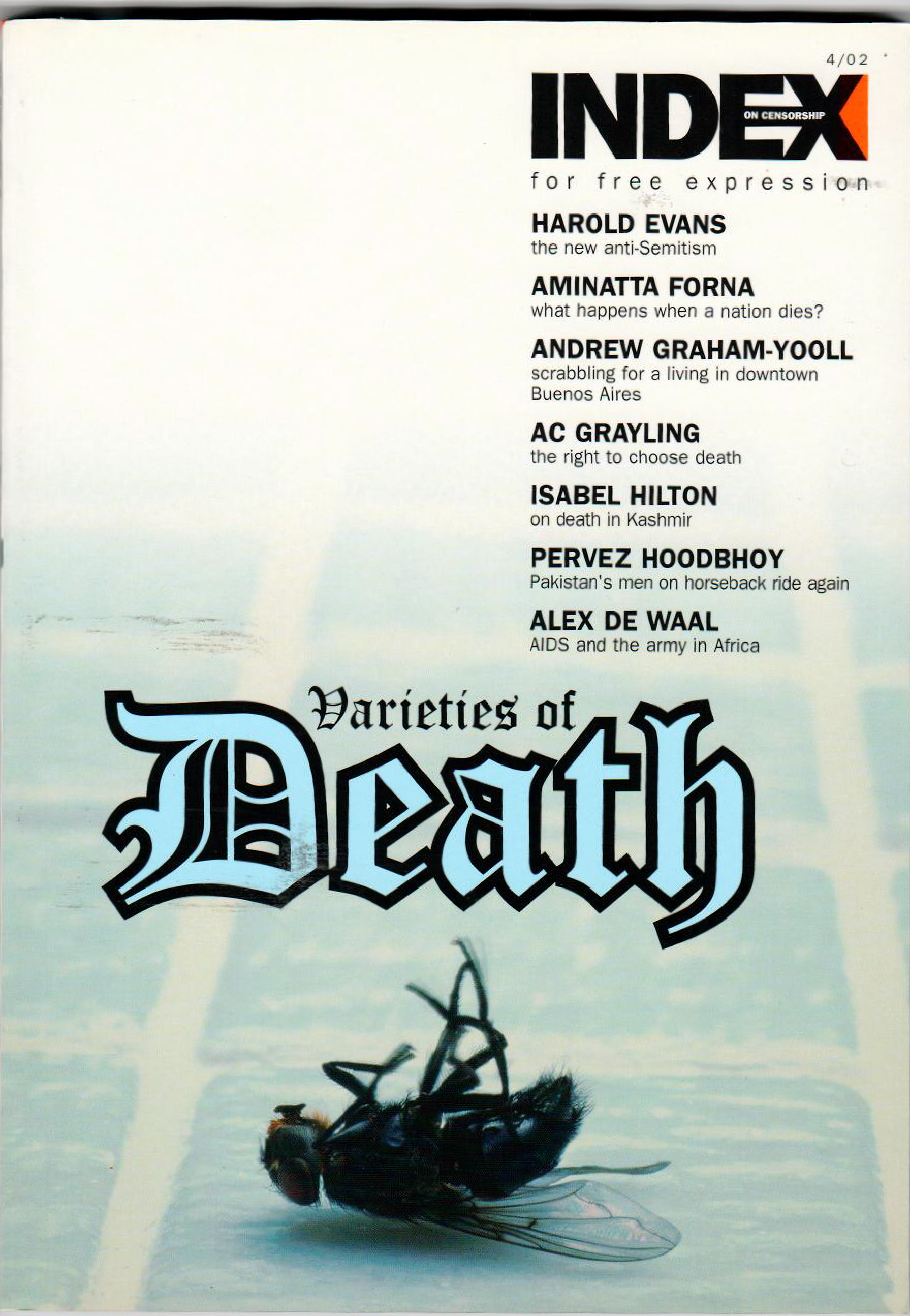
Varieties of death, the winter 2002 issue of Index on Censorship magazine.
Beyond the Gun is a collection of photographs and statements from Kashmiri people in 2002. Its emotive language and testimony from residents who felt betrayed by India’s handling of the region, coupled with photographs of members of the community, make for a stirring read.
By Sheba Chhachhi, each photograph and collected testimony tells a different story. Some, like the words from carpet worker Jana, show the danger of bringing to light the problems caused by local authorities and provides a chilling account of escaping molestation by a border security force soldier.
Jana said: “I faced the power of his gun with the power of my mind. I felt no fear. I had the axe. Had the axe not been there; there was a rolling pin, a ladle. If I had a gun, they would have seized it long ago. These are my own implements. No one can take them away from me.”[/vc_column_text][/vc_column][/vc_row][vc_row][vc_column][vc_column_text]

Partition, the November 1997 issue of Index on Censorship magazine
In 1997, Pakistan and India celebrated 50 years of independence, but continuing tensions between the two muted the festivities.
In this article from that year, Eqbal Ahmad set out the problems caused by a misguided approach to decolonisation by the United Kingdom, which led to the partition of Pakistan and Bangladesh.
Though not specifically about the troubles in Kashmir, much of the hostility between Pakistan and India is thoughtfully explained and ensures a greater understanding of the conflict.[/vc_column_text][/vc_column][/vc_row][vc_row][vc_column][vc_column_text]

Varieties of death, the winter 2002 issue of Index on Censorship magazine.
In this 2002 article, Sidharth Bhatia claims India once had the world’s largest and freest media, something which has now changed. It takes a historical journey explaining chronologically just how India’s media freedom has been squeezed.
Bhathia ponders the problems populist jingoism can have on freedoms, citing the border war in 1999 as a prime example.
“More worrying is the decline in any challenge to the received wisdom on contentious issues such as human rights abuses, especially in Kashmir. This was seen at its most blatant during the border war at Kargil in 1999 between Indian and Pakistani soldiers (disguised as irregulars) who had infiltrated the area.”[/vc_column_text][/vc_column][/vc_row][vc_row][vc_column][three_column_post title=”You may also like to read” category_id=”581″][/vc_column][/vc_row]
16 Oct 2019 | News and features, Spain, Student Reading Lists
The Spanish Supreme Court has jailed nine Catalan separatist leaders for their roles in the independence referendum in 2017, deemed illegal by the Spanish government. Oriol Junqueras, former vice president of Catalonia, was sentenced to 13 years, the highest sentence handed out. A new international arrest warrant for former Catalonia President Carles Puigdemont, who fled to Belgium, has been issued. As protesters clash with police on the streets of Barcelona over the sentencing, Index looks back on the struggle for freedom of expression in Spain and particularly Catalonia, from the last years of General Francisco Franco’s regime, to the present.
Poems from Catalonia vol 1, 2 1972
https://journals.sagepub.com/doi/pdf/10.1080/03064227208532183
Joan Brossa, born in 1919, wrote poetry about Franco’s invasion and destruction of independent Catalonia during the Spanish Civil War (1936-1939). His works are allegories about the bitterness over the cultural repression in Catalonia under Franco. However, the allegories were too transparent to avoid censorship by the Spanish authorities. Index acquired copies of some of the censored poems.
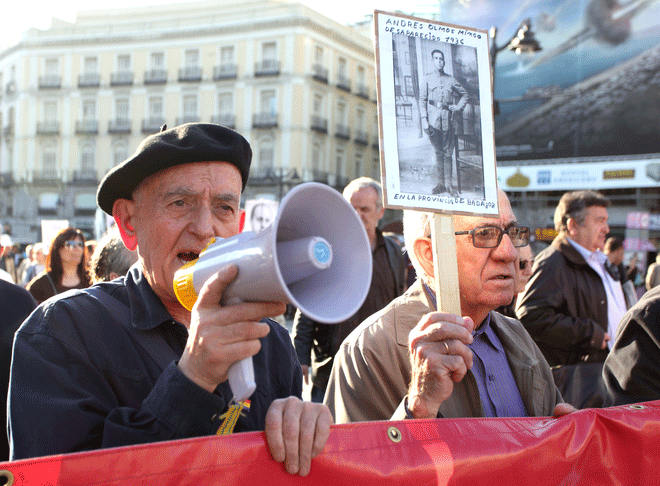
Weekly meeting to remember Franco’s victims in the Puerta del Sol, Madrid [Image credit: NathaliePaco – Demotix]
https://journals.sagepub.com/doi/pdf/10.1080/03064227408532323
The final years of Franco’s regime saw a confused attitude towards censorship. Franco wanted to outwardly present a degree of liberalism to the international political community, while still enforcing censorship inwardly. John Butt argued that this may be why right-wing extremists suppressed artists and thinkers and got away with it; the government allowed these groups to do their dirty work. Vigilantes poured acid over some of Picasso’s works and threw bricks through bookshop windows. The police did not charge them. It was a period of haphazardly applied censorship, creating an atmosphere of insecurity for Spanish writers.
Spanish journalists in jeopardy vol 9,6 1980
https://journals.sagepub.com/doi/pdf/10.1080/03064228008533131
Even in post-Franco Spain, there were significant threats to freedom of expression for journalists. The 1978 constitutional guarantee of press freedom proved to be a formality, not upheld in practice. In May 1980, 60 journalists, writers and artists faced court action, with offenses including “outrage to public morals”. Juan Luis Cebrian, the author of this article, was the editor of the Madrid daily newspaper El Pais. He was sentenced to three months in prison for an editorial, published two years prior in 1978, in which he defended freedom of expression. Read about his experiences here.
Shifting an elephant – freedom of expression in spain today vol 11, 3 1982
https://journals.sagepub.com/doi/pdf/10.1080/03064228208533377
In the first two years after Franco’s death there was excitement about the new democracy, as many newspapers and magazines were set up. But in a bid to pacify Francoists, laws remained in place that allowed journalists to be targeted. Offenses included insult or disrespect to the army and the royal family. In 1977 anti-terrorist legislation was brought in, which failed to define “apology” for terrorism. This left it open to abuse by those wishing to penalise journalists. Read Malcolm Coad’s article from this pivotal point in Spanish history here.
Puppet state vol 46,1 2017
https://journals.sagepub.com/doi/full/10.1177/0306422017703623
Spanish puppeteers Raúl García Pérez and Alfonso Lázaro de la Fuente were arrested in 2016 for glorifying terrorism. The evidence against them was the content of puppet show Pérez and Lázaro de la Fuente were performing as part of carnival festivities in Madrid. The show had included a character holding a banner displaying the name of a fictional terrorist organisation. Lázaro de la Fuente told Index about his experiences following his arrest, and discussed the consequences of performers being persecuted for their art in modern Spain.
No laughing matter vol 46, 2 2017
https://journals.sagepub.com/doi/full/10.1177/0306422017716058
Silvia Nortes explored the reforms the Spanish political party, the Partido Popular, pushed through which allowed the prosecution of comedians, journalists and social media users, quashing their right to freedom of expression. Nortes cites several examples of comedians who have been prosecuted and even jailed. Read their jokes here.
They can’t stop the music vol 46,4 2017
https://journals.sagepub.com/doi/full/10.1177/0306422017748822
Cesk Freixas, a musician and member of Popular Unity Candidacy, a pro-Catalonia independence party, has drawn the attention of the ruling Partido Popular. Unhappy with his strong pro-independence message, they attempted to have his shows cancelled.
Freixas, who performs in Catalan, told Index he has been accused, among other things of “boasting the Catalan language”. Singer-songwriter Albert Pla has also faced discrimination for championing independence for Catalans. Read more about censorship of the independence movement here.
19 Jul 2019 | Magazine, News and features, Student Reading Lists
[vc_row][vc_column][vc_single_image image=”107971″ img_size=”full” add_caption=”yes”][vc_column_text]Andrew Graham-Yooll served as editor for the Index on Censorship magazine from 1989-1993. He was then, and remained until his death in 2019, committed to free expression and the free press around the world. In honour of his memory, Index is featuring some of the highlights of his writing for the magazine about his home country Argentina. The pieces featured cover a broad range of topics and events primarily related Argentinian art and journalism, and showcase Graham-Yooll’s fierce integrity and characteristic humor. [/vc_column_text][/vc_column][/vc_row][vc_row][vc_column width=”1/4″][vc_single_image image=”94869″ img_size=”full” add_caption=”yes” onclick=”custom_link” link=”https://journals.sagepub.com/doi/pdf/10.1080/03064227308532221″][/vc_column][vc_column width=”3/4″][vc_column_text]Letter from Argentina
June 1973, vol. 2 issue: 2
“Censorship in Argentina is not a sin of the State, but a sickness of society”. Thus closes Andrew Graham-Yooll’s scathing indictment of censorship and self-censorship in the Argentinian press, in an environment where press controls are loosely organised but vicious.Graham-Yooll describes the routine torture and corruption in the criminal-justice system that the Argentinian press seems uninterested in, and expresses his opinion that, however damaging state censorship is, it is the fear and self-censorship it engenders in the press that is truly destorying Argentina’s soul.
Read the full article[/vc_column_text][/vc_column][/vc_row][vc_row][vc_column width=”1/4″][vc_single_image image=”94773″ img_size=”full” add_caption=”yes” onclick=”custom_link” link=”https://journals.sagepub.com/doi/pdf/10.1080/03064227508532398″][/vc_column][vc_column width=”3/4″][vc_column_text]The Argentinian press under Peron
March 1975, vol. 4 issue: 1
Andrew Graham-Yooll reflects on the record he kept of all the obstacles to press freedom and independence in Argentina during the early 1970s. He outlines, in broad strokes, the conflict between right- and left-wing branches of Peronism, and what the escalating conflict between the two–and the right wing’s eventual victory–meant for the operation of the Argentinian press. The press had faced restrictions and instability under Alejandro Augustin Lanusse and Hector Jose Campora that exploded into violence and direct government interference with print, radio, and television media under Raul Alberto Lastiri, Juan Peron himself, and his widow, Isabel Martinez de Peron.
Read the full article[/vc_column_text][/vc_column][/vc_row][vc_row][vc_column width=”1/4″][vc_single_image image=”94399″ img_size=”full” add_caption=”yes” onclick=”custom_link” link=”https://journals.sagepub.com/doi/pdf/10.1080/03064227908532905″][/vc_column][vc_column width=”3/4″][vc_column_text]Arrests in Argentina
March 1979, vol. 8 issue: 2
Graham-Yooll takes a look into the fate of the nine workers at El Independiente, a left-of-center, nationalist local paper in the poor Argentinian province of La Rioja that “established itself on the wrong side of every provincial administration”. After Juan Peron was restored to power in 1973, the paper faced increasing harassment and frequent suspensions, until by 1976, El Independiente was permanently and forcibly closed, with seven of the nine workers arrested under dubious charges, some of their families in exile or tortured, and the remaining two workers missing. The Argentinian Newspaper Publishers’ Association demanded their release, but at the time of the article’s writing they were all still imprisoned.
Read the full article[/vc_column_text][/vc_column][/vc_row][vc_row][vc_column width=”1/4″][vc_single_image image=”90901″ img_size=”full” add_caption=”yes” onclick=”custom_link” link=”https://journals.sagepub.com/doi/pdf/10.1080/03064229508535825″][/vc_column][vc_column width=”3/4″][vc_column_text]Coming Home
January 1995, vol. 7 issue: 2
This article is not an obituary, but it deals with the death of a gay Argentianian novelist, Manuel Puig. Puig died of AIDS in Mexico, a fact that Graham-Yooll was surprised to see mentioned in coverage of the artist and his work. Argentina’s social climate tolerates homosexuality to a degree, Graham-Yooll says, but only unobstrusive or plausibly deniable homosexuality. The brutal targeted repression under the military junta of “putos, guerrilleros, y faloperos” (queers, guerillas and drug addicts) is still in living memory for many gay Argentinians, and though the coverage of Puig could be a positive sign, discussion of homosexuality and gay rights was still not part of mainstream news coverage or culture in Argentina at the time of the article’s writing.
Read the full article[/vc_column_text][/vc_column][/vc_row][vc_row][vc_column width=”1/4″][vc_single_image image=”90587″ img_size=”full” add_caption=”yes” onclick=”custom_link” link=”https://journals.sagepub.com/doi/pdf/10.1080/03064220408537324″][/vc_column][vc_column width=”3/4″][vc_column_text]News From Patagonia
April 2004, vol. 33 issue: 2
In 2003, shortly before the article was written, Argentina’s Supreme Court struck down a law passed some twenty years earlier under the junta, which had made it illegal to provide broadcasting licences to community radio. The nominal grounds for that practice had been that it was easier to prevent the infiltration by the regime’s ideological enemies of commercial radio. However, before the law was struck down, its true raison d’etre had become the preservation of cronyism and political nepotism. Graham-Yooll uses the Supreme Court’s ruling as a chance to take stock of Argentina’s broadcasting landscape, with particular focus on the florshing of extra-legal, shoestring FM radio stations.
Read the full article[/vc_column_text][/vc_column][/vc_row][vc_row][vc_column width=”1/4″][vc_single_image image=”89187″ img_size=”full” add_caption=”yes” onclick=”custom_link” link=”https://journals.sagepub.com/doi/pdf/10.1080/03064220512331339490″][/vc_column][vc_column width=”3/4″][vc_column_text]The Pain and the Memory: The Legacy of Nunca Mas
February 2005, vol. 34 issue: 1
In 1984, Argentina’s National Commission on the Disappearance of Person released a report, Nunca Mas (Never Again), on the human rights abuses under the National Reorganisation Process between 1976 and 1983 that devastated many in the country. In this piece, written in 2012 Graham-Yooll discusses the abuses of the military and the many ways Argentina has attempted to grapple with the report, from the junta trials to a more recent photo exhibition of the atrocities. He shares a few of his own experiences from that time and describes how both dictatorship and report live on in Argentinian memory.
Read the full article[/vc_column_text][/vc_column][/vc_row][vc_row][vc_column width=”1/4″][vc_single_image image=”89185″ img_size=”full” add_caption=”yes” onclick=”custom_link” link=”https://journals.sagepub.com/doi/pdf/10.1080/03064220500125985″][/vc_column][vc_column width=”3/4″][vc_column_text]Our Father, Who Art in Art
May 2005, vol. 34 issue: 2
In 2004, right after the Argentinian branch of the Catholic Church received praise for opening up politically, Leon Ferrari opened up an exhibition in Buenos Aires reviewing the collusion between the church and some of Latin America’s worst regimes over the centuries. Graham-Yooll describes some of the most important exhibit pieces and the extreme backlash the exhibit received from the church and laymenry–sometimes simultaneously, as in the entertaining story of a Christian vandal whose destruction of a piece was turned into an exhibit piece itself.
Read the full article[/vc_column_text][/vc_column][/vc_row][vc_row][vc_column width=”1/4″][vc_single_image image=”89186″ img_size=”full” add_caption=”yes” onclick=”custom_link” link=”https://journals.sagepub.com/doi/pdf/10.1080/03064220500125985″][/vc_column][vc_column width=”3/4″][vc_column_text]Cumbia Villera: the Sound of the Slums
August 2005, vol. 34 issue: 3
A new genre of music is becoming popular in Latin America: the “politically incorrect” cumbia villera, a high-energy, hard-hitting new street music with a Carribbean beat. The lyrics to these songs, according to Graham-Yooll, are “vile and often violent”: they are filled with misogynistic abuse, incitement to prison breaks and riots, and enthusiastic encouragement of alcohol and hard drug use. For this reason, the Argentinain government at the time of the article was considering censoring cumbia villera, but in what Graham-Yooll asserts is a reflection of Argentina’s growing class divide, the music is gaining a mass following in the slums that seems unstoppable.
Read the full article[/vc_column_text][/vc_column][/vc_row][vc_row][vc_column width=”1/4″][vc_single_image image=”89110″ img_size=”full” add_caption=”yes” onclick=”custom_link” link=”https://journals.sagepub.com/doi/full/10.1177/0306422012456134″][/vc_column][vc_column width=”3/4″][vc_column_text]The Past in Hiding
September 2012, vol. 41 issue: 3
Nearly 40 years after the dirty war, Graham-Yooll examines two new books whose dialogue he believes represent hope that the record of atrocities committed by the junta can be known and Argentina can thus “come to terms” with its past. The first book, Final Disposal, is a set of nine interviews journalist Ceferino Reato conducted with members of the erstwhile regime in prison, in which those members display, according to Graham-Yooll, both generosity with information and a cold and brutal view of their own crimes. The second book, From Guilt to Forgiveness, is a personal account written by Norma Morandini, a former journalist and politician, about her personal journey from denial of what happened under the regime to a reckoning.
Read the full article[/vc_column_text][/vc_column][/vc_row][vc_row][vc_column width=”1/4″][vc_single_image image=”80566″ img_size=”full” add_caption=”yes” onclick=”custom_link” link=”https://journals.sagepub.com/doi/full/10.1177/0306422015605706″][/vc_column][vc_column width=”3/4″][vc_column_text]From murder to bureaucratic mayhem: After Argentina’s dictatorship, what happened next for the country’s journalists
September 2015, vol. 44 issue: 3
After Argentina emerged from under the rule of the military junta in 1983, press freedom improved considerably. Now, journalists are not murdered by the regime, but silenced through systemic harassment and the entangled web of cronyism. Graham-Yooll explains how the leader of Argentina at the time of the article, Cristina Fernández de Kirchner, has developed a distinct and effect new “means of controlling the message”: not reactive censorship, but preemptive control of content through control of the ownership and cash flows of the media.
Read the full article[/vc_column_text][/vc_column][/vc_row][vc_row][vc_column][vc_basic_grid post_type=”post” max_items=”4″ element_width=”6″ grid_id=”vc_gid:1565953044570-154320b2-e16d-10″ taxonomies=”8890″][/vc_column][/vc_row]






















